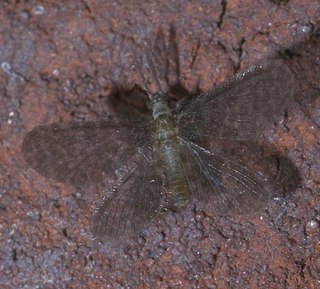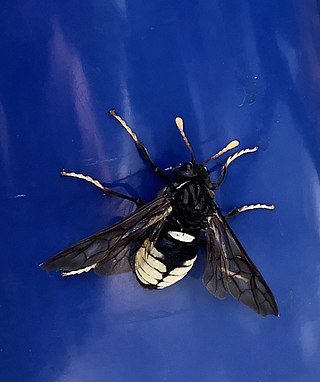
Nallachius americanus is a species of pleasing lacewing in the family Dilaridae. It is found in the Caribbean Sea, North America, and South America.
Zeluroides americanus is a species of assassin bug in the family Reduviidae. It is found in Central America and North America.
Ceraleptus probolus is a species of leaf-footed bug in the family Coreidae. It is found in North America.

Ceraleptus is a genus of leaf-footed bugs, in the family Coreidae. There are about nine described species in Ceraleptus.
Leptocerus americanus is a species of long-horned caddisfly in the family Leptoceridae. It is found in North America.
Scymnus americanus, the American scymnus lady beetle, is a species of dusky lady beetle in the family Coccinellidae. It is found in North America.

Cimbex americanus, the elm sawfly, is a species of sawfly in the family Cimbicidae. This is a very large species of Hymenoptera, with adults measuring 3 cm and larvae reaching 5 cm long. If captured, adults may buzz and use their powerful spiny legs defensively. However, like other sawflies, this species does not possess a sting. The fly Opheltes glaucopterus is a parasite of the prepupae stage of this sawfly.
Platystethus americanus is a species of spiny-legged rove beetle in the family Staphylinidae. It is found in Central America, North America, and Oceania.
Leptinus americanus is a species of round fungus beetle in the family Leiodidae. It is found in North America.
Xenochodaeus americanus is a species of sand-loving scarab beetle in the family Ochodaeidae. It is found in North America.
Rhacognathus americanus is a species of predatory stink bug in the subfamily Asopinae first described by Carl Stål in 1870. It is native to North America, but may be extinct.
Anelpistus is a genus of false longhorn beetles in the family Stenotrachelidae. There are at least two described species in Anelpistus.
Anelpistus americanus is a species of false longhorn beetle in the family Stenotrachelidae. It is found in North America.

Pytho americanus is a species of dead log beetle in the family Pythidae. It is found in North America. This beetle is able to overwinter both as a larva and an adult. It synthesizes glycerol during cold acclimation.
Syntomus americanus is a species of ground beetle in the family Carabidae. It is found in North America.

Stenocoris is a genus of rice bugs in the family Alydidae. There are more than 20 described species in Stenocoris, found in Africa and the Americas,
Monalocoris americanus is a species of plant bug in the family Miridae. It is found in the Caribbean Sea and North America.
Atlanticus americanus, known generally as the American shieldback or American shield-bearer, is a species of shield-backed katydid in the family Tettigoniidae. It is found in North America.
Ceraleptus pacificus is a species of leaf-footed bug in the family Coreidae. It is found in Central America and North America.
Miscophus americanus is a species of square-headed wasp in the family Crabronidae. It is found in North America.




